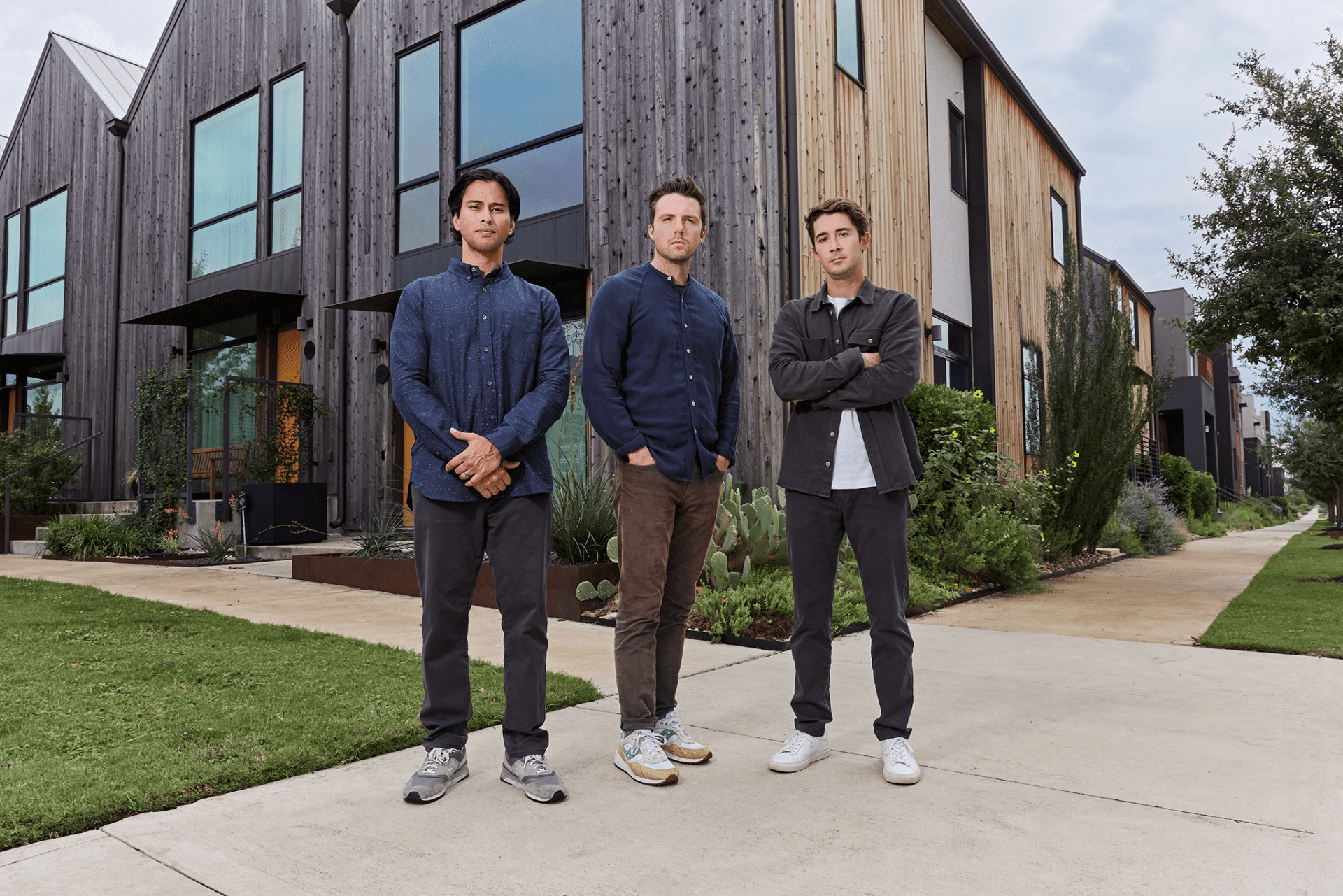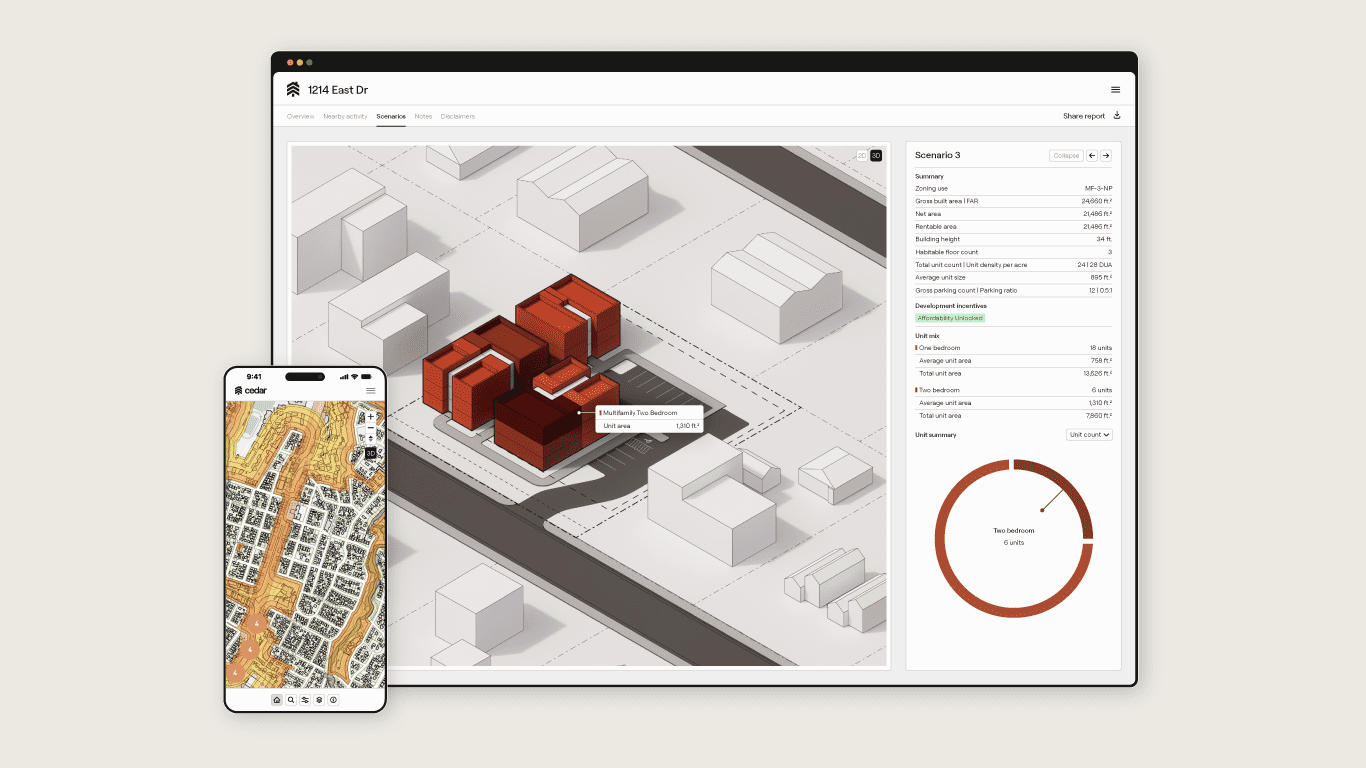
Cedar’s generative building design platform for housing and urban development receives backing from Caffeinated Capital and real estate powerhouses to help real-estate developers build denser, more affordable cities
The US housing market is short 6.5 million homes after more than a decade of under-building relative to population and demand growth. Cedar is today announcing a $3M seed funding round to take this problem head on, with software that helps real-estate developers and professionals maximize the housing potential of urban infill properties.
Cedar believes that the complexities of urban development are driving builders to construct homes ever-farther from city centers, thus contributing to the supply-demand mismatch creating a crisis of affordability today. Kyle Vansice, co-founder of Cedar added: “Not only is the US not building enough housing to support our population growth, we’re not building homes in the right places – urban centers where current and future generations want to live and work, and be closer to their friends, family, and cultural amenities.”
The funding round was led by Caffeinated Capital with participation from Tishman Speyer Ventures, Maria Davidson (CEO of celebrated construction startup Kojo), David Rubenstein via Shorewind Capital, Alumni Ventures, among others. Cedar’s cap table also includes global venture capital firm Antler as an early investor (pre-seed round)
Founded in 2022 by Kyle Vansice, Nate Peters and Rahul Attraya, Cedar is radically collapsing the time and cost for developers to source and evaluate real-estate projects, a major inefficiency in today’s real-estate market. It often takes longer to acquire, design, and permit a housing project than it does to build it – largely due to the slow, consultant driven, and regulatory burdened process of solving the 3D puzzle that is a real-estate development project. And while 80% of cities are composed of housing, almost no software exists to help developers know where and what can be built in the city – a critical market gap Cedar is filling.
The Cedar platform uses generative algorithms and a mix of public and proprietary data to quickly generate a broad array of building designs, accurately predicting the development yield on any parcel in a city, and converting complex land-development regulations into real development scenarios that maximize a property’s financial potential. Cedar is on a mission to standardize a fragmented process of value creation that typically takes months of consultant work and adds hundreds of thousands of dollars to each development project.
By challenging the fundamentals on housing design and location, Cedar is creating a pathway to help deliver the residential needs of communities across the US. “By connecting local zoning and land development regulations with a national standard for infill housing and urban density, Cedar is the first technology startup that is offering a fresh vision for housing development and design for the future,” Nate Peters, co-founder of Cedar added.
Cedar believes the immediate opportunity for builders and developers lies in places that were previously built for largely single-family development, but offer the potential to dramatically densify to create more livable and walkable neighborhoods. The future of urban development needs to move beyond the binary of either single-family homes or luxury high-rise to include the “missing middle” scale – a term coined by Dan Parolek and his firm Opticos Design.

Rahul Attraya, co-founder of Cedar added: “The smaller, non-institutional “missing middle” scale projects are critical to creating a more economically and environmentally sustainable density in our cities. They present the key to providing the breadth of affordable options cities need. But getting innovative housing built in urban areas is not easy, and builders, developers, and the design community take big risks to make them happen – Cedar is supporting this effort by providing sophisticated planning and analysis technology that reduces risk and maximizes their potential.
The infill multi-family construction is a $300B+ market annually, and is expected to nearly double by 2030. It is not only America’s fastest growing housing development type, but according to a recent University of California Berkeley study, the single most effective tool in reducing the carbon emissions of our society.
Cedar has coverage across Austin now, but has ambitious plans to expand to a number of major American cities over the next 12-18 months. Varun Gupta, Partner at Caffeinated Capital, commented: “Characterizing the economic value of any parcel of land through its current and future development opportunities will drive massive value to developers, brokers, states and municipalities, and other stakeholders. With it, Cedar could help usher in a new golden era of municipal development and help solve America’s housing shortage.”
Tyler Norwood, General Partner US at Antler, Cedar’s initial investor remarked: “We backed the Cedar team from day zero. As an early investor, we worked with Kyle, Rahul, and Nate as they experimented and fought to crack open a wedge into this market. The Cedar team is ambitious and tenacious, exactly the qualities required to scale a mammoth proptech opportunity. This 0-1 stage of a company is such a hard but exhilarating time — I feel honored that a team this strong gave Antler the opportunity to be a partner on this journey and it is exciting to see Cedar quickly gaining traction. I look forward to continue supporting the team as they build the future of urban infill development starting in our own backyard, Austin, TX. “
About Cedar
Cedar is reducing the cost and time to source and evaluate real-estate projects by building software that accurately predicts development yield on any opportunity, converting complex land-development regulations into real development options that maximize a property’s financial potential.
Using proprietary algorithms and data, Cedar empowers real-estate developers to evaluate potential projects 10X faster, standardizing a fragmented process that typically takes months of consultant work and adds hundreds of thousands of dollars to each development project.
Cedar is on a mission to help developers maximize ROI, de-risk investment by accurately predicting development yield as fast as possible. Doing so will create a more efficient real-estate market that will lead to more affordable, livable, walkable cities.
About Caffeinated
Caffeinated invests early (often at inception stage) and throughout the lifecycle of technology companies that produce meaningful value and transform the largest markets in the world.
About Tishman Speyer
Tishman Speyer is a leading owner, developer, operator and investment manager of first-class real estate in 36 key markets across the United States, Europe, Asia and Latin America. Our portfolio spans market rate and affordable residential communities, premier office properties and retail spaces, industrial facilities, and mixed-use campuses. We create state-of-the-art life science centers through our Breakthrough Properties joint venture, and foster innovation through our strategic proptech investments.
With global vision, on-the-ground expertise and a personalized approach, we are unparalleled in our ability to foster innovation, quickly adapt to global and local trends and proactively anticipate our customers’ evolving needs. By focusing on health and wellness, enlightened placemaking and customer-focused initiatives such as our tenant amenities platform, ZO, and our flexible space and co-working brand, Studio, we tend not just to our physical buildings, but to the people who inhabit them on a daily basis. Since our inception in 1978, Tishman Speyer has acquired, developed, and operated 533 properties, totaling 223 million square feet, with a combined value of over $129 billion (U.S.). Our current portfolio includes such iconic assets as Rockefeller Center in New York City, The Springs in Shanghai, TaunusTurm in Frankfurt and the Mission Rock neighborhood currently being realized in San Francisco.
About Alumni Ventures
Alumni Ventures offers accredited individuals access to professional-grade venture capital— a key asset class missing from the portfolios of many sophisticated investors. Since launching its first venture fund in 2014, AV has raised more than $1.2 billion from nearly 10,000 individual accredited investors, and has built a community of over 650,000 opt-in subscribers to their innovation-focused newsletters. AV evaluates thousands of venture investment opportunities every year and has a portfolio of over 1,200 venture backed companies. In 2022, PitchBook ranked AV as the #1 most active VC firm in the US, and #3 in the world. AV funds are private, for-profit, and not affiliated with or sanctioned by any school. For more information, visit av.vc.
